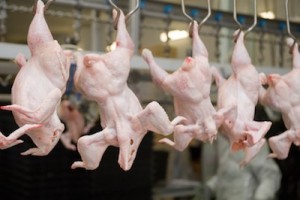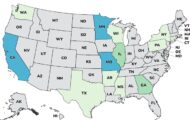Wenonah Hauter, Executive Director of Food & Water Watch, has responded to USDA’s claims that their email telling inspectors to not interfere with industry collection of Salmonella data was appropriate.
 In a statement she said that, “what was troubling about the email was that it told the district managers that the purpose of the data collection was for the industry to develop its own voluntary pathogen performance standards that it was going to enforce on poultry processing plants. It went on to say that FSIS inspection personnel assigned to the plants were not to interfere with the National Chicken Council data collection and that they had no right to look at the data that was collected.
In a statement she said that, “what was troubling about the email was that it told the district managers that the purpose of the data collection was for the industry to develop its own voluntary pathogen performance standards that it was going to enforce on poultry processing plants. It went on to say that FSIS inspection personnel assigned to the plants were not to interfere with the National Chicken Council data collection and that they had no right to look at the data that was collected.
“In other words, the poultry industry would create the standards for pathogen levels in chicken parts, and they would only ‘voluntarily’ stick with them. Not only would the industry be able to decide how much Salmonella or Campylobacter there is on your chicken, but there would be no USDA enforcement of the standard.”
The privatization of chicken inspections is troubling in many ways. The “Modernization of Poultry Slaughter Inspection“, which the USDA proposed in January 2012, turns inspection over to employees of the poultry processing plants. Just one government inspector will be allocated per plant. Line speeds will increase to 175 birds per minute, calling into question not only thorough inspection of the birds, but safety of the workers.
In 2000, the USDA lost a court case against Supreme Beef Processors, when the beef processors challenged the government’s ability to recall contaminated foods. The court actually said that, “the district court determined that the USDA was without statutory authority to promulgate the Salmonella performance standards.”
Inspection laws do not have pathogen standards. FSIS has no authority to set enforceable pathogen performance standards. The standards are voluntary. Several lawmakers, including Senator Kirsten Gillibrand (D-NY), have tried to remedy this situation by introducing the Safe Meat and Poultry Act. It has not passed the Legislature.
And we see the results in outbreaks. The huge Foster Farms Salmonella chicken outbreak sickened 430 Americans and sent 40% of them to the hospital. That number is actually more than 13,000 sick people, since the multiplier for Salmonella outbreaks, which are notoriously under-reported, is 30.3. That was the second of Foster Farms’ Salmonella chicken outbreaks last year (or a continuation of the first outbreak).
Ms. Hauter concludes by saying, “in light of the rule proposed by FSIS in January 2012 that would turn over most inspection responsibilities to the poultry companies to perform themselves, the Englejohn email seems to indicate that there is a dangerous deregulatory effort underfoot that would take FSIS out of the food safety business altogether. Instead of trying to enhance its ability to regulate food safety standards, this agency seems to be turning the keys over to the industry to police itself. That is not in the interest of public health and it needs to be stopped.”




